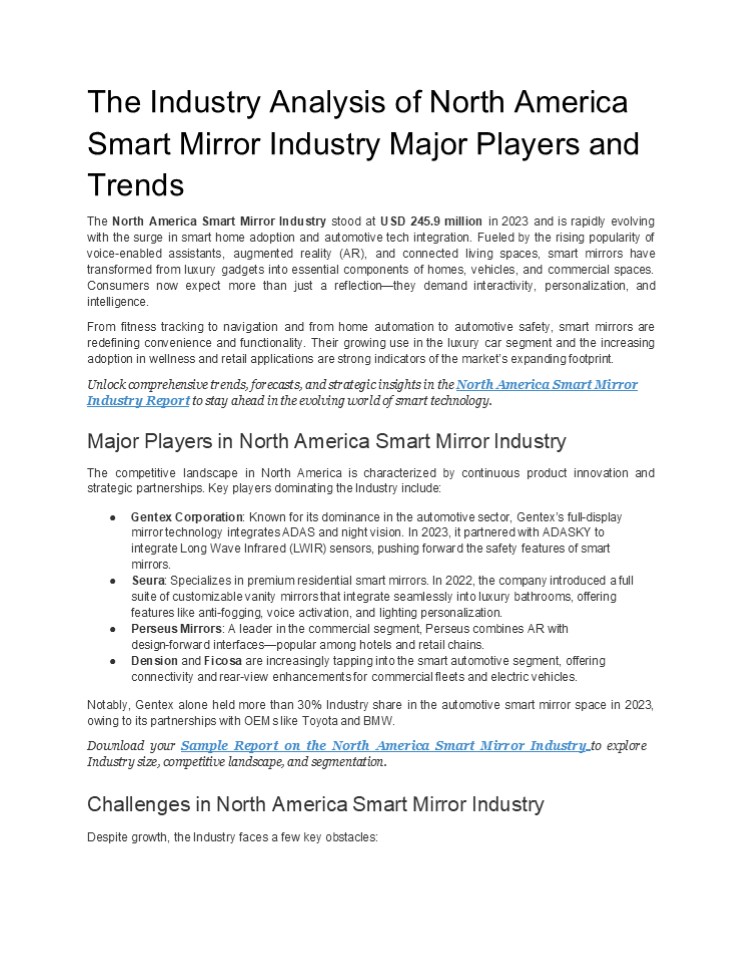North America Smart Mirror Industry Major Players and Trends
Title: North America Smart Mirror Industry Major Players and Trends
1
The Industry Analysis of North America Smart
Mirror Industry Major Players and Trends
- The North America Smart Mirror Industry stood at
USD 245.9 million in 2023 and is rapidly evolving
with the surge in smart home adoption and
automotive tech integration. Fueled by the rising
popularity of voice-enabled assistants, augmented
reality (AR), and connected living spaces, smart
mirrors have transformed from luxury gadgets into
essential components of homes, vehicles, and
commercial spaces. Consumers now expect more than
just a reflectionthey demand interactivity,
personalization, and intelligence. - From fitness tracking to navigation and from home
automation to automotive safety, smart mirrors
are redefining convenience and functionality.
Their growing use in the luxury car segment and
the increasing adoption in wellness and retail
applications are strong indicators of the
markets expanding footprint. - Unlock comprehensive trends, forecasts, and
strategic insights in the North America Smart
Mirror Industry Report to stay ahead in the
evolving world of smart technology. - Major Players in North America Smart Mirror
Industry - The competitive landscape in North America is
characterized by continuous product innovation
and strategic partnerships. Key players
dominating the Industry include - Gentex Corporation Known for its dominance in
the automotive sector, Gentexs full-display
mirror technology integrates ADAS and night
vision. In 2023, it partnered with ADASKY to
integrate Long Wave Infrared (LWIR) sensors,
pushing forward the safety features of smart
mirrors. - Seura Specializes in premium residential smart
mirrors. In 2022, the company introduced a full
suite of customizable vanity mirrors that
integrate seamlessly into luxury bathrooms,
offering features like anti-fogging, voice
activation, and lighting personalization. - Perseus Mirrors A leader in the commercial
segment, Perseus combines AR with design-forward
interfacespopular among hotels and retail
chains. - Dension and Ficosa are increasingly tapping into
the smart automotive segment, offering
connectivity and rear-view enhancements for
commercial fleets and electric vehicles. - Notably, Gentex alone held more than 30 Industry
share in the automotive smart mirror space in
2023, owing to its partnerships with OEMs like
Toyota and BMW. - Download your Sample Report on the North America
Smart Mirror Industry to explore Industry size,
competitive landscape, and segmentation. - Challenges in North America Smart Mirror Industry
- Despite growth, the Industry faces a few key
obstacles
2
- Regulatory Hurdles California's 2024 mandate
requiring all smart devices to feature robust
cybersecurity frameworks added significant costs
to smart mirror manufacturing and compliance
efforts. As data privacy regulations tighten,
smart mirror companies must invest in encryption
and secure firmware updates to maintain user
trust. - Integration Complexity Compatibility issues
persist, particularly when smart mirrors need to
sync with diverse home automation systems or
automotive software. In 2023, 1 in 5 users
reported dissatisfaction due to delayed or
incomplete software integration, particularly in
mixed-brand smart homes. - Check out related insights in the Europe ADAS
Industry and Europe 3D Camera Industry Forecast
for a broader perspective on automotive smart
tech. - Emerging Opportunities
- While challenges exist, the horizon is filled
with growth opportunities - AR and AI-Driven Mirrors By 2028, smart mirrors
equipped with AI are expected to account for 40
of the total market. These mirrors will offer
hyper-personalized experiencestracking daily
habits, recommending skincare routines, or
alerting users to changes in health vitals. - Expansion in Retail Hospitality With AR
integrations, retailers are using smart mirrors
for virtual try-onsboosting conversion rates by
30. Hotels are using them for contactless
check-ins and concierge services, creating
frictionless customer experiences. - Smart Cities Healthcare Integration Backed by
the U.S. National Institute of Standards and
Technology (NIST), smart mirrors are being
embedded into smart city infrastructure.
Meanwhile, the U.S. Department of Health and
Human Services is funding projects that integrate
mirrors with health IT for behavioral monitoring
and elderly care solutions. - Conclusion
- The North America Smart Mirror Industry is
undergoing a significant transformation, merging
AI, IoT, AR, and sustainability into everyday
functionality. As consumer expectations evolve
and digital ecosystems expand, smart mirrors will
no longer be viewed as futuristic novelties but
rather as intuitive interfaces of our connected
lives. - Backed by government initiatives, growing tech
investments, and demand for immersive
experiences, the future of smart mirrors is
reflective of a larger shift toward smart living. - You can also read about Inside the MEA Dietary
Supplements Industry Growth Drivers, Challenges,
and Opportunities

